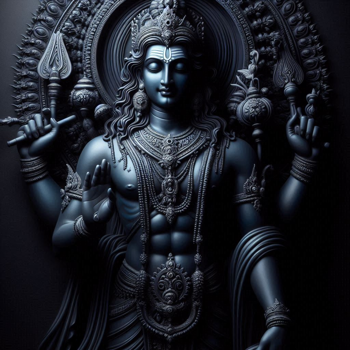-
Preservation and Protection: Lord Vishnu is considered the protector of the universe. Performing Vishnu Puja is believed to invoke his divine protection over one's life, ensuring safety, stability, and well-being.
-
Spiritual Growth: Worshiping Vishnu is said to help in attaining spiritual enlightenment and progress on the path of righteousness (dharma). It encourages the development of virtues like compassion, patience, and devotion.
-
Overcoming Obstacles: Vishnu Puja is thought to help in removing obstacles and difficulties in one’s personal and professional life, as Vishnu is often depicted as a divine force that conquers evil and restores balance.
-
Peace and Prosperity: The puja is performed to seek peace of mind and prosperity. Lord Vishnu’s blessings are believed to bring harmony in family life, financial stability, and success in various endeavors.
-
Fulfilling Desires: Devotees often perform Vishnu Puja to fulfill their worldly desires. It is believed that sincere worship of Vishnu can grant one's wishes and help achieve goals.
-
Cleansing of Sins: The ritual is also considered a way to purify the soul and cleanse past sins, thereby leading to a more virtuous and fulfilling life.
- Brings harmony and peace into the home.
- Ensures protection from negative influences and evil forces.
- Promotes spiritual growth and strengthens one’s connection with the divine.
- Helps overcome challenges and difficulties in life.
- Encourages prosperity and success in business and career.
- Aids in the fulfillment of personal desires and ambitions.
- Purifies the soul and helps in the atonement of past mistakes.
- Fosters good health and longevity.
- Enhances mental clarity and emotional stability.
- Cultivates virtues such as patience, humility, and devotion.
Vishnu Puja, when performed with sincere devotion, is a powerful means to receive the divine blessings of Lord Vishnu, leading to a life filled with peace, prosperity, and spiritual fulfillment.
Performing Vishnu Puja is a sacred act that requires devotion, preparation, and a calm mind. Below is a step-by-step guide to conducting Vishnu Puja at home or in a temple.
1. Preparation
- Select an Auspicious Day: Choose a suitable day for the puja, often Thursdays or Ekadashi (11th day of the lunar fortnight) are considered auspicious for Vishnu Puja.
- Cleanse Yourself and the Puja Space: Take a bath and wear clean, preferably traditional attire. Clean the puja space and set up an altar with an idol or image of Lord Vishnu.
- Gather Puja Materials:
- Idol or picture of Lord Vishnu
- Kalash (copper or silver pot)
- Puja thali (plate) with incense, lamp (diya), kumkum (vermilion), turmeric, rice, sandalwood paste
- Fresh flowers (preferably tulsi leaves, which are sacred to Vishnu)
- Fruits, sweets, and other offerings (prasad)
- Ghee or oil for the lamp
- Sacred thread (if available)
- Panchamrit (mixture of milk, yogurt, ghee, honey, and sugar)
- Water in a small pot
- Bell and conch (optional)
2. Setting the Altar
- Place the Idol: Position the idol or image of Lord Vishnu on a clean and decorated altar, facing east or north.
- Arrange the Offerings: Place the offerings, including fruits, sweets, and flowers, in front of the idol. Arrange the lamps, incense sticks, and other puja items neatly on the puja thali.
3. Invocation (Dhyana)
- Sit Calmly: Sit in front of the altar on a mat, facing the deity, in a comfortable posture.
- Meditation: Close your eyes and meditate on Lord Vishnu, visualizing his form and divine presence. Chant "Om Namo Bhagavate Vasudevaya" or any Vishnu mantra to invoke his presence.
4. Sankalpa (Pledge)
- Take the Sankalpa: With folded hands, state your intention for performing the puja, mentioning your name, family members, and the specific purpose of the puja. This is a mental or verbal pledge to complete the worship with devotion.
5. Kalash Sthapana (Establishing the Kalash)
- Fill the Kalash: Fill the Kalash with water, place a few grains of rice, a betel nut, and a coin in it. Cover the mouth of the Kalash with mango leaves and place a coconut on top.
- Decorate the Kalash: Apply kumkum and turmeric to the Kalash, and tie a sacred thread around it. Place it on the altar near the deity.
6. Invocation of Lord Vishnu
- Light the Lamp and Incense: Light the lamp (diya) and incense sticks. Offer them to the deity while chanting mantras or Vishnu's names.
- Offerings (Upacharas):
- Pushpanjali (Offering of Flowers): Offer fresh flowers or tulsi leaves to the deity while reciting mantras.
- Aarti: Perform aarti with a lighted lamp, moving it in a circular motion in front of the deity.
- Naivedya (Offering of Food): Offer the fruits, sweets, and other prasad to the deity. Sprinkle a little water around the prasad with a flower to purify it.
- Panchamrit Abhishekam (Ceremonial Bath): If possible, bathe the idol of Lord Vishnu with Panchamrit (mixture of milk, yogurt, ghee, honey, and sugar), followed by pure water.
7. Chanting Mantras and Stotras
- Vishnu Sahasranama: If possible, recite the Vishnu Sahasranama (1000 names of Lord Vishnu) or any Vishnu stotra (hymn) like Vishnu Chalisa or Vishnu Ashtottara Shatanamavali (108 names of Vishnu).
- Mantra Chanting: Chant "Om Namo Bhagavate Vasudevaya" or "Om Vishnave Namah" as many times as you can, with sincerity and focus.
8. Aarti and Concluding Rituals
- Final Aarti: Perform a final aarti, offering the flame to Lord Vishnu.
- Pradakshina: Circumambulate the altar (move around it clockwise) three times, if space allows.
- Prayers: Offer your final prayers, seeking blessings for yourself and your family. Express gratitude to Lord Vishnu for his presence and blessings.
9. Distribution of Prasad
- Distribute Prasad: After the puja, distribute the prasad (the food offerings) among family members and others present. Tulsi leaves offered to Vishnu are considered especially sacred and are often shared as prasad.
10. Immersing the Kalash Water
- Dispose of the Kalash Water: The water from the Kalash can be sprinkled around the house for purification, or it can be poured into a sacred water body.
This completes the Vishnu Puja. The puja can be performed individually or with family members, and it is an expression of deep devotion and reverence towards Lord Vishnu. Regular practice of this puja is believed to bring peace, prosperity, and divine blessings into one's life.




